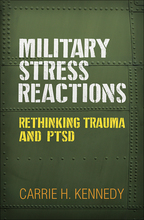Military Stress Reactions
Rethinking Trauma and PTSD
Carrie H. Kennedy
Hardcovere-bookprint + e-book
Hardcover
orderMay 7, 2020
ISBN 9781462542949
Price: $49.00 288 Pages
Size: 6" x 9"
Many people—including some mental health professionals and service members themselves—have the misconception that military deployment is highly likely to cause posttraumatic stress disorder (PTSD). This book gives practitioners a more nuanced understanding of military stress reactions and related mental health concerns, from transient adjustment problems to clinical disorders. Drawing on expert knowledge of military environments and culture, Carrie H. Kennedy provides vital guidance for evidence-based assessment, intervention, and prevention. Kennedy emphasizes that overdependence on the diagnosis of PTSD can lead to suboptimal care, and shows how to tailor treatment to each service member's or veteran's needs. A crucial addition to any practitioner's library, the book is illustrated with numerous case vignettes.
“Dr. Kennedy takes us on a journey through past conflicts and historically describes the evolution and understanding of the stressors of war experienced by generations of those who have served in uniform….There are 26 vivid case stories, which illustrate how knowledge about military environments, culture, and individual risk factors can be applied to real-world treatment planning and clinical decision making….This volume should be required reading for anyone who wants to help heal those service members experiencing mental health challenges, especially, but not limited to, mental health practitioners who work in VA or military settings, but also to broader groups such as those in academia who teach at the under-graduate and graduate levels in the areas of Family Studies and Human Development. Additionally, any program in a community where there is a military installation or large veteran population should have staff who understand the military issues described in this book.”
—Family and Consumer Sciences Research Journal
“This may be the most comprehensive review of military stress reactions ever published. Kennedy carefully integrates the vast scientific literature with military history, culture, and operations. Few people have the boots-on-the-ground clinical, operational, and deployment-related background and experience to produce such an impressive work. The 26 captivating case presentations will hold the reader's interest from cover to cover. Kennedy's description of the continuum of military stress reactions and their interplay with concussion is invaluable. I highly recommend this book for clinicians, researchers, and graduate students involved in consultation, assessment, and treatment of military service members and veterans.”
—Alan L. Peterson, PhD, ABPP, Krus Endowed Chair in Psychiatry; Director, STRONG STAR Consortium; and Director, Consortium to Alleviate PTSD, University of Texas Health Science Center at San Antonio
“The past few decades have seen significant and rapid advances in our understanding of PTSD and stress reactions among military personnel. In this book, Kennedy provides the most down-to-earth and easy-to-read explanation of these issues that I have ever read. She tackles common myths and misconceptions about PTSD and military service, and provides simple descriptions of the treatments and strategies that are proven to work.”
—Craig J. Bryan, PsyD, ABPP, Executive Director, National Center for Veterans Studies, University of Utah
“From her wealth of clinical experience, research on classification and interventions, and extraordinary insights as a service member herself, Kennedy has created a monumental and special book. She explains risk factors for military stress reactions, teaches skills we need for working with those exposed to stress and trauma, describes prevention strategies, and shows how to facilitate posttraumatic growth. This volume is an extraordinary achievement for turbulent times.”
—Walter E. Penk, PhD, ABPP, Department of Psychiatry and Behavioral Sciences (retired), Texas A&M College of Medicine; Consultant, Edith Nourse Rogers Memorial Veterans Hospital, Bedford, Massachusetts
Table of Contents
List of CasesList of Tables
1. Introduction: Basic Truths about Military Stress, Trauma, and Posttraumatic Stress Disorder 
2. Military Stress Reactions and Nomenclature
3. Conceptual Framework of Military Stress Reactions
4. Risk Factors for Military Stress Reactions
5. Military Cultural Barriers to and Facilitators of Help Seeking and Care
6. Culturally Competent Assessment of Service Members and Veterans Posttrauma
7. Additional Posttrauma Considerations and Comorbidities in Service Members
8. Interplay of Military Stress Reactions and Concussions
9. Intervention for and Treatment of Military Stress Reactions
10. Prevention Strategies for Military Stress Reactions
11. Posttraumatic Growth and Military Service
References
Index
